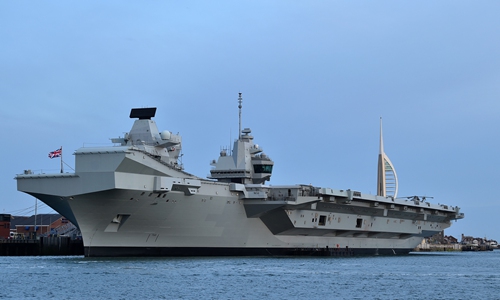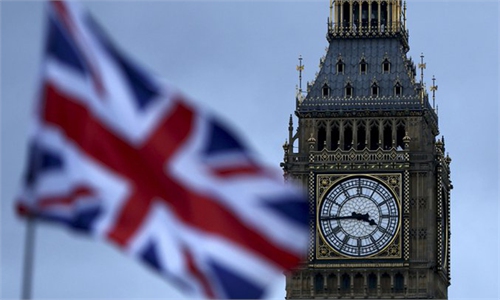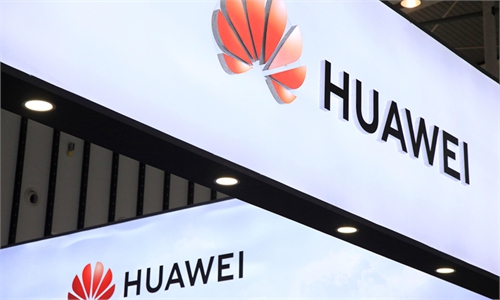
The HMS Queen Elizabeth aircraft carrier is pictured at anchor on the Solent, following an event to commemorate the 75th anniversary of the D-Day landings, in Portsmouth, southern England, on June 5, 2019. Photo: AFP
British military chiefs have drawn up plans to base the HMS Queen Elizabeth, one of the UK's new aircraft carriers, in the Far East to play a part in countering "an increasingly assertive China," according to The Times on Tuesday. A carrier strike group, with the HMS Queen Elizabeth as its centerpiece, will conduct military exercises in the Far East with allies including the US and Japan early next year.
Why did the UK choose such a period to release the news? First, the UK wants to seek attention with the hot-button South China Sea issue. Second, it wants to show loyalty to the US.
The UK was once a powerful empire. It is one of the five permanent members of the UN Security Council. But now, it seems the UK has become the US' henchman. The UK's incoherent position on China shows that it has lost the demeanor of a major power - as well as its independent position and attitude.
The US has been using Huawei, the national security law for Hong Kong, and the South China Sea to make troubles for China. Since the UK has responded to the US on Hong Kong and Huawei, it is also willing to interfere in the South China Sea issue as an outsider. By showing off its military power, the UK wants to demonstrate it is still a traditional major power with a tough navy. But it is only making itself look more like a US pawn.
London's military strength cannot afford the consequences of such provocations. Some Britons still dream that their country is as powerful as "the empire on which the sun never sets". Those days are long faded. The UK is not satisfied being a second-class country, but it is actually overwhelmed and underpowered.
The HMS Queen Elizabeth, with a displacement of 65,000 tons, doesn't even have any UK-made fighter jets on it - not to mention that its sea trials were not as smooth as the UK expected.
The UK is bluffing. It should know its limitations before attempting to strong-arm China, which is no longer a weak military country to be bullied as it was during the Opium Wars. Whereas the US' nuclear-powered carriers with displacement over 100,000 tons have repeatedly come to the South China Sea but failed to frighten China, the HMS Queen Elizabeth won't be a deterrence to China even if it is sent to the Far East.
After Brexit, many Britons want to show that the UK is still capable. But from the perspective of British aircraft carriers' actual deployment strengths, it is possible for the UK to put its carriers in occasional appearance in the North Atlantic or the Asia-Pacific region. However, the current Royal Navy is unlikely to be able to sustain long-term patrols in the two oceans. After all, the British carrier fleet itself is seriously flawed.
The British side may clearly know its military limitations. Although it doesn't want to admit to these limitations, the UK cannot change the reality that it is not militarily capable of contending with China.
It is still unclear whether the HMS Queen Elizabeth can manage to solve its problems and carry out its first grand voyage. On the other hand, the UK is cozying up to the Trump administration's anti-China campaign. Therefore, the military's decision would probably be affected, and even reversed, due to political reasons.
To sum up, the British military's aim to demonstrate power and loyalty to the US is full of political symbolism. This is far greater than its practical significance. But how many countries take seriously the UK's military strength right now? Britain needs a realistic view of itself instead of biting off more than it can chew.
The author is a senior research fellow at the PLA Naval Military Studies Research Institute. opinion@globaltimes.com.cn



